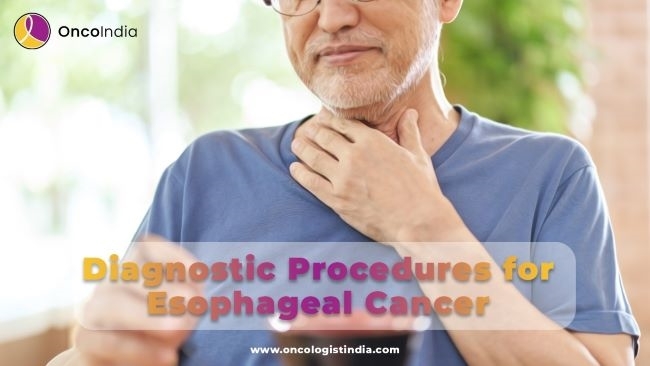In the majority of cancer cases, a biopsy stands as the definitive method for confirming the presence of cancer in a specific area of the body. During a biopsy, the doctor extracts a small tissue sample for thorough analysis in a laboratory setting. In situations where a biopsy is not feasible, alternative tests may be recommended by the doctor to facilitate the diagnostic process.
How is Esophageal Cancer Diagnosed?
Esophageal cancer starts in the lining of the esophagus, the tube connecting the throat to the stomach. When a doctor suspects the presence of esophageal cancer in a patient, various tests are performed for the diagnosis. If cancer is confirmed, further tests are conducted to determine its stage and create a treatment plan.

Signs of difficulty in swallowing and chest pain are often identified as Esophageal cancer. However, as it usually doesn't show symptoms until later stages, it might be discovered accidentally during tests for other health issues.
Barium Swallow Study: For this test, the patient is instructed to drink liquid containing barium and which is then examined in the X-rays. The barium coats your esophagus, revealing any tissue changes on the X-ray.
Endoscopy: While performing an endoscopy, a flexible tube which has video lens attached to it, is passed down the throat to examine the esophagus for signs of cancer or irritation.
Biopsy: Here the doctor would use a special scope called an endoscope which would be passed down the throat to collect a tissue sample from suspicious areas. This sample is then sent to a laboratory to check for cancer cells.
Understanding the Stage of Cancer
Once the condition of esophageal cancer is confirmed, the doctor may suggest more tests to check if the cancer has spread to lymph nodes or other parts of your body.
Following are some of the tests post diagnosis
Based on the results of these procedures, the doctor determines the stage of the esophageal cancer, which is actually represented by Roman numerals from 0 to IV. Lower stages signify smaller, superficial cancer which is limited to the esophagus, while stage IV indicates advanced cancer that has spread to other parts of the body.
The cancer staging system is continually advancing as doctors enhance diagnosis and treatment. Your doctor uses your cancer stage to tailor appropriate treatments for you.
What are the Treatment Options?
Dr. Shiva Kumar, an Oncologist at Trust In Hospital, underscores that the recommended treatment entails surgical intervention, specifically the complete removal of the esophagus. Various surgical approaches exist for this procedure, including the traditional open approach.
Additionally, minimally invasive techniques such as Vax esophagectomy, employing a Transthoracic approach resembling a small keyhole, and laparoscopic esophagectomy are available options.
A notable advancement in recent times is the adoption of robotic esophagectomy, where the entire surgery is conducted with the assistance of a robot. Each approach presents distinct advantages and disadvantages, and the choice is tailored to individual circumstances.
For certain patients, a combined approach of chemotherapy and radiotherapy may be deemed necessary, serving as the primary mode of treatment. This integrated strategy, known as chemo-radiotherapy, is considered a definitive and comprehensive treatment for such cases.
A third alternative is Neoadjuvant therapy, specifically chemo-radiation therapy. In this approach, a combination of chemotherapy and radiation is administered initially to reduce the size of the tumor. Subsequently, surgical intervention is pursued once the tumor has sufficiently decreased in size.
These definitive treatment options yield significant results. In addition to these, alternative procedures such as bypass surgery, the placement of a feeding jejunostomy, and strengthening the esophagus to address obstructions are available.
What are the chances the cancer will recur (come back) with these treatment plans?
According to Dr. Shivakumar, the likelihood of cancer recurrence is contingent upon the stage at which it is diagnosed. In the early stages, such as stage 1 and 2, the prospects for recovery are favorable. However, at stage 3, the chances of recovery diminish to approximately 30-40%. Unfortunately, in stage 4, a complete cure is generally not achievable.
What risks or side effects are there to the treatments you suggest? Are there things I can do to reduce these side effects?
Ensuring proper nutrition is crucial for individuals with esophageal cancer. Many patients may experience difficulty swallowing, leading to reduced intake and malnourishment. It becomes imperative to prioritize the consumption of liquids and wholesome nutrition to address these challenges and support overall well-being.
Blog Reviewed By: Dr. Shiva Kumar Uppala